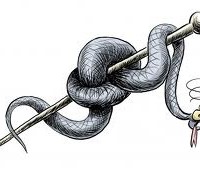- Two Thanksgiving Thoughts for the ACAPosted 11 years ago
- Shop til you Drop at the Healthcare Marketplace Part 2: Frustration!Posted 11 years ago
- An Early Casualty in the Affordable Care FightPosted 11 years ago
- Some Good News for a ChangePosted 11 years ago
Roll Up Your Sleeve and Let Me Take Your Purse
 A recent lecture by Professor Ezekiel Emmanuel of the University of Pennsylvania raises a topic every one should be curious about. Why does health care cost so much in the US?
A recent lecture by Professor Ezekiel Emmanuel of the University of Pennsylvania raises a topic every one should be curious about. Why does health care cost so much in the US?
Just a reminder, the US spends more per capita on health care than any other country in the world, 50% more than Switzerland in second place. What we are spending each year on Health Care in the US is roughly equal to the gross national product of France. The increase in going up more steeply than take home pay in this country and has been for decades. By about 2037, one of three dollars we spend in this country will be on health care. This is not sustainable and the economy of this country will be seriously out of kilter if we proceed along this path.
 The number one driver is technology, as mentioned before. People want the latest and the best. That is very expensive. Take just one example: today prostate cancer surgery has improved because of robotic assistance. Each robot costs about a million dollars. Then you need to train people to make it work. That costs money too.
The number one driver is technology, as mentioned before. People want the latest and the best. That is very expensive. Take just one example: today prostate cancer surgery has improved because of robotic assistance. Each robot costs about a million dollars. Then you need to train people to make it work. That costs money too.
Surgery is longer, the scars fewer, the recovery shorter and the complications hopefully less. If cancer is involved, the drugs are better and have less side-effects. They can be given less frequently than originally thought. This still costs a lot of money when the final bill arrives.
We now treat things like baldness, saggy breasts and erectile dysfunction that once went untreated. If you are wealthy, you can buy chemical peels and plastic surgery, implants…. you complete the list.
 A 2006 Kaiser Family Foundation showed that the richest 1% in the US consume 21.2% of the medical services. The top 10% spent 63.3%. The top 50% consume 96.8% of those dollars. Is this fair? Is this even sane?
A 2006 Kaiser Family Foundation showed that the richest 1% in the US consume 21.2% of the medical services. The top 10% spent 63.3%. The top 50% consume 96.8% of those dollars. Is this fair? Is this even sane?
Nothing that has happened in the interim would like have reversed these 2006 percentages. Which suggests that the best thing you can do for your health in the US is be filthy rich. Other studies reinforce the relationship between wealth and access to care. Dr. Emmanuel points out that people with insurance live longer after a diagnosis of breast cancer and have better outcomes.
Does this add to the controversy over income disparities in the US?
Oh, yes it does.
 Other countries do a better job of seeing that services go to those who need them, not just those with incomes that allow them to consume and over-consume. More health care is not necessarily better care. But under-treatment and delayed diagnosis are definitely bad for you.
Other countries do a better job of seeing that services go to those who need them, not just those with incomes that allow them to consume and over-consume. More health care is not necessarily better care. But under-treatment and delayed diagnosis are definitely bad for you.
Now is a good time to stop and ask yourself what is your philosophy of distribution of finite health care resources? Does having a healthy work force matter? Does having healthy young people provide us with anything important for the future? The upcoming election will decide in which direction this country goes in 2013 and beyond. And we will all be following along.
Tom Godfrey







